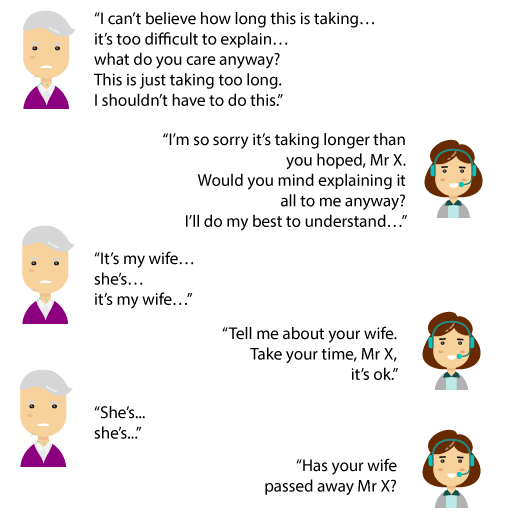Liz Doig of Wordtree sets out ways to keep conversations calm, collected and helpful, when dealing with upset customers.
1. Make Sure Your IVR and On-Hold Messages Are Pulling Their Weight
Psychologically, it’s much more frustrating to be standing on a train platform staring at the word Delayed than it is to be looking at the message Delayed by one hour.
The same principle can be applied to your call queues. Telling customers how long they have to wait provides a much less frustrating experience than waiting in the queue for a long period of time with no updates as to how the queue is progressing.
Indefinite, undefined delay robs customers of control. The train passenger who knows she’ll be waiting at least an hour can go and have a coffee or get a cab instead. For your customer waiting on the phone, knowing there’s more than an hour’s wait gives them some control. They can decide to make a coffee and call back… or watch videos of cute cats, keeping their phone on loudspeaker so they know when they get through.
For your customer waiting on the phone, knowing there’s more than an hour’s wait gives them some control. They can decide to make a coffee and call back…
So, give customers an idea of how long they’re likely to be in the queue – and provide messages that make it clear which types of information are available online.
And if you know you’re getting calls about subjects to which you have no answers, put this on your call-holding messaging too. From a customer’s point of view, it’s better to have a message like this:
“If you’re calling to find out about how to access business grants, we don’t yet have enough information from the government to help you. Please check the website and follow us on LinkedIn and Twitter. As soon as the government lets us know how to proceed, we’ll share this information on social media.”
…than to wait for ages, only to find out you don’t know anything.
You can find lots of great tips for creating IVR messages in difficult times in our article:How to Create Reassuring On-Hold and IVR Messages – With Examples
2. Be Sensitive (Unhappiness Sometimes Sounds Like Anger, Impatience and Even Forgetfulness)
Nerves, uneasiness and grief can all manifest themselves in different ways. The super-grumpy customer who is talking to you about closing an account may have just lost someone. The person who keeps asking you to repeat the same information may be struggling because he’s scared.

If ever there was a time for being calm and patient, this is it. Sometimes this means call times for some people may take slightly longer than if they were on top form. But it’s better to have a call that takes an extra couple of minutes than it is to have a customer need to call you again.
Remember that emotions can be weird. What they feel like on the inside often isn’t what they look like on the outside. So if someone seems angry, frustrated, forgetful, tense or foggy, give them space to say what they need to say.
Here’s a genuine call we heard a couple of years ago – which was handled beautifully by a wonderful contact centre colleague. At the beginning of the conversation, the customer sounded furious. His voice was raised and he sounded short of breath.

The point is that the customer service colleague might have been forgiven for hanging up. The customer was raging. But the colleague was sensitive enough to recognize there might be more going on for his customer. Mr X’s wife had indeed died.
Of course, nobody should have to take outright aggression from customers. But bear in mind that even a moderate amount of stress can take its toll – and fear has a nasty habit of masquerading as anger. So breathe, take your time and remember that you can help most if you assume any inappropriate emotion might be a sign of a customer who really, really needs your help.
In the following article there are some extra tips to follow, in case the customer is aggressive: Dealing With Angry Customers
3. Remember, Our Ability to Absorb Information Decreases With Stress
Psychologists who study productivity and health and safety in the workplace have known for years that stressed people lose the ability to absorb and process information.
Stress – even at low, mundane, levels – makes our bodies produce fight or flight hormones.
It’s because stress – even at low, mundane, levels – makes our bodies produce fight or flight hormones. These have the effect of making our minds and bodies become less attentive to anything that doesn’t look as though it might hurt us.
So, we glaze over as we try to read instructions, for example… or we don’t read an email properly… and though we’re nodding, we haven’t really heard anything a colleague is telling us. These are all normal, human reactions to stress.
It’s safe to assume that most of the people we’ll talk to these days are – at least to some degree – stressed. So we should make efforts to be understood, even by people whose stress levels have gone through the roof and who are struggling to hold on to information.
Here are a couple of pointers:
i. Use Short Words
English is an amazing language which contains vast numbers of words – many more, in fact, than a lot of other languages. The reason for this is that English comes from two main sources – Old English (a form of old German) and Latin. There are a lot of other influences too, but German and Latin are the main ones.
All of this means that you quite often have two words in English that both mean exactly the same thing… like this:
| Latin Roots | Germanic Roots |
|---|---|
| Acquire | Get |
| Require | Need |
| Repast | Meal |
| Expedient | Fast/Quick |
When we’re learning English as infants and kids, we tend to learn the words in the right-hand column first – probably because they’re easier to say.
Then, as we get older, our parents and teachers encourage us to learn the words in the left-hand column. (It would be a rare five-year-old, for example, who said “I require a repast expediently.” Kids say things like “I need food NOW!”)
The thing is, though, that we sometimes come to believe that the words in the right-hand column aren’t as serious – that they’re “baby words”. And so we believe that when we’re communicating in serious circumstances we shouldn’t use them.
When this happens, we start saying things like: “We would require your signature prior to commencing any action…”
To a customer who’s stressed, this is a very difficult statement to take in and make sense of. So go easy on the long words, and use the shorter ones instead.
“We need your signature before we can start…” is just as professional – but it’s much easier for a stressed person to understand.
ii. Be Clear and Direct
Stressed customers are looking to you and the organization you represent for direction. So don’t be afraid of giving it to them.
Don’t feel bad about using words and phrases like “must” and “do not”. If you’re a nice person, talking like this may feel a bit over-the-top and even rude. But remember, by being direct and clear, you’re not leaving any room for confusion – and this is helpful.
In these examples, the clear and direct version isn’t aggressive – it’s simply a statement of fact.
| Room for Confusion | Clear and Direct |
|---|---|
| It’s a good idea to stay at home. | You must stay at home. |
| Please refrain from contacting us in non-emergency circumstances. | If your situation is not life-threatening, do not call us. |
| Should you wish to place an online order, please be advised that we are currently experiencing delays. | You can place an online order. But it may take much longer than normal to get to you. |
4. Be Honest
These are extraordinary times. Nothing is certain – and it’s ok to say so.
If a customer wants to know when your a delayed service will start again and you don’t know, say: “I’d love to be able to tell you, but we simply don’t know.” Take the customer’s details and promise to contact them when you do know.
If you’re trying to sell something, don’t promise what you can’t deliver, however tempting it may be. Don’t say: “We have engineers working around the clock to help small businesses!” when you know your engineers are unable to.
Be honest. Say: “We’ll do it as quickly as we can – but it’s not going to be before [INSERT DATE]. Our suppliers are struggling at the moment and we have more people than normal off sick.”
Customers are generally very forgiving of forgivable circumstances. So tell them what’s happening. If instead you say what you think a customer wants to hear, rather than what you can deliver – your customer will inevitably find you out and think badly of your company.
5. Most of All, Be Kind
“Kind” is a lovely word. It comes from the same root as the word “kin” – people who belong together and share characteristics.
It also means being gentle, patient, giving and sharing – acting for the common good rather than simply in our own interests.

Liz Doig
When historians write about the COVID-19 outbreak in 2020, for example, they will no doubt focus on high-level concepts like strategies, politics and healthcare. But ultimately, kindness and selflessness are what will see us through.
Because if there’s anything that the COVID-19 crisis has taught us, it’s that we can all do remarkable, unusual things when we pull together. We are all kin. And contact centre agents have the ability to spread kindness with every call.
For more on being nice to customers, read our article: 14 Tips to Provide a Kind Customer Experience
Thanks to Liz Doig at Wordtree for sharing this article with us.
For more expert advice from Liz, be sure to read some of her other great articles, which can be found by clicking any of the following links:
- “Sorry for the Inconvenience” – How to Offer a Genuine Apology
- Customer Service Emails and Letters: How to Review and Improve Your Templates
- How to Create Reassuring On-Hold and IVR Messages – With Examples
Author: Liz Doig
Published On: 15th Apr 2020 - Last modified: 10th Jun 2024
Read more about - Skills, Angry Customers, Coronavirus, Handling Customers, Language, Liz Doig



































